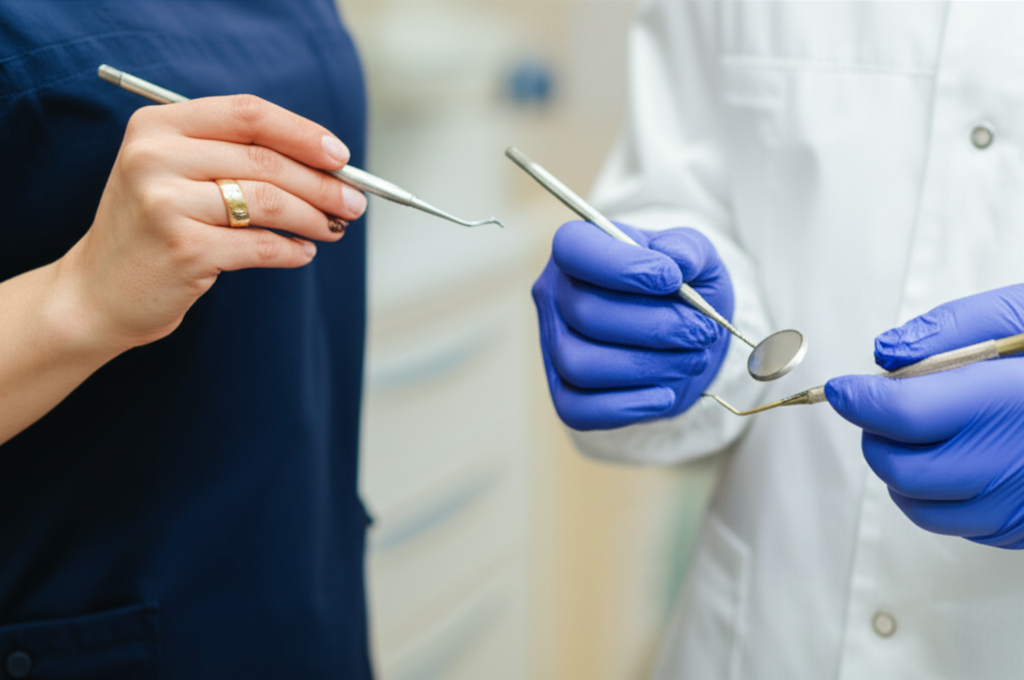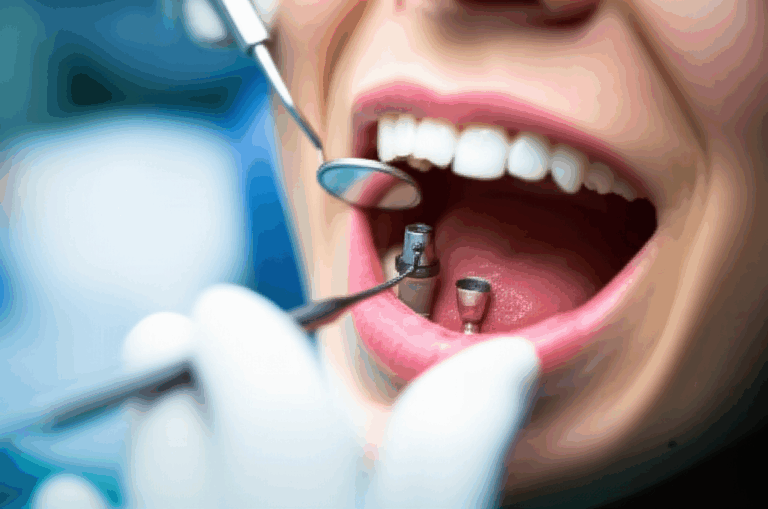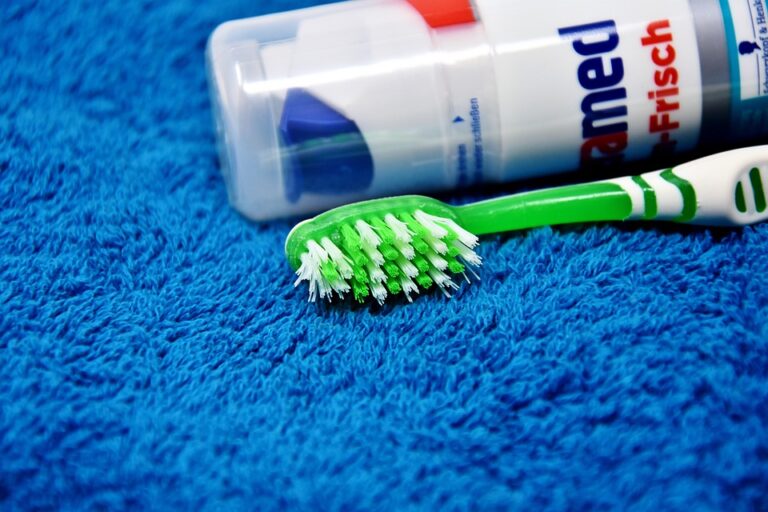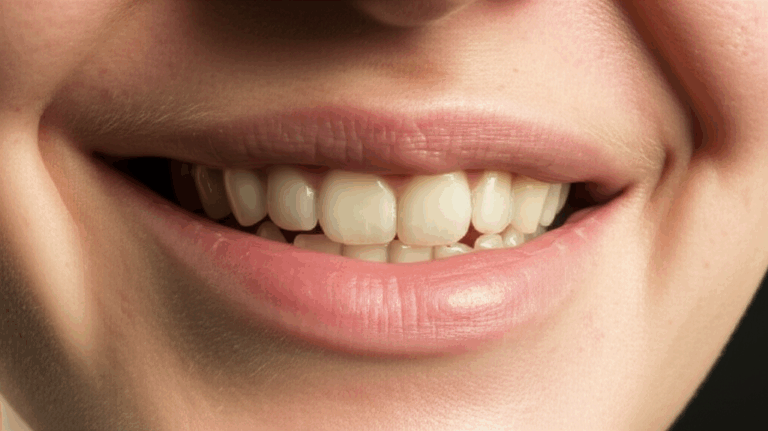
From RDH to DDS/DMD: Your Easy Guide to Becoming a Dentist as a Dental Hygienist
Want to know if a dental hygienist can become a dentist? You’re in the right place! If you’re a dental hygienist thinking about moving up in your job, this article shows you how. You’ll learn every step it takes, what you need, the good and bad sides, and answers to big questions like “Is it worth it?” Whether you dream of having your own dental office or just want to help people in new ways, this guide is worth your time.
Table of Contents
Can a Dental Hygienist Really Become a Dentist?
Yes! A dental hygienist can become a dentist, but it’s a big step. Many people make this career change. You don’t have to stay a hygienist forever – there’s a real way forward.
When I first thought about making this move, I had a lot of doubt. Would dental schools want someone who started as a hygienist? It turns out, not only can you become a dentist, but dental schools like people with real patient experience.
This article is for you if you’re asking:
- “How do I become a dentist after dental hygiene?”
- “Is the extra time and money worth it?”
- “What are the steps I need to follow?”
Why Would a Hygienist Want to Become a Dentist?
Dental hygienists are already skilled workers, but you might want more out of your career. Maybe you want more power, higher pay, or the chance to have your own practice.
Here are a few reasons:
- Scope of Practice: As a dentist, you can do more. Fill cavities, do surgeries, even put in implants.
- More Money: According to the Bureau of Labor Statistics, dentists make nearly twice as much as hygienists.
- Be the Boss: Dentists lead the team. If you like to make choices and help others learn, this job could be right for you.
- Personal Goals: Maybe you just want a new hard thing to do or dream of owning your own clinic.
You might think this path is only for young students. It’s not! Many dental schools like older, experienced students just as much. Your life story can help you stand out.
What Are the Steps to Go from Hygienist to Dentist?
Here’s the step-by-step path:
- Most dental schools want you to have a bachelor’s degree. Some schools might take people with just an associate’s, but that’s very rare.
- Biology, Chemistry, Organic Chemistry, Physics, Microbiology, Biochemistry, Anatomy, and Physiology.
- This big test covers science, problem solving, and thinking skills.
- Spend extra hours watching dentists—even outside your job. Schools want to see you really want to become a dentist.
- Your old teachers, dentists you shadow, and your hygiene program director are good people to ask.
- This is your chance to stand out. Talk about your patient skills and why you want to be a dentist.
- Schools want students who do things outside the classroom too.
- This is the main way to apply for dental schools in the US.
- Each school does interviews in their own way. Be ready to talk about being a hygienist and why you want to be a dentist.
You might need a post-baccalaureate program if you’re missing important science classes. It’s common—don’t let that stop you.
What Courses and Degrees Do You Need?
You need a bachelor’s degree. If you only have an associate’s degree from hygiene school, you’ll need more classes. Often, you can finish needed science courses as part of a post-bacc program.
Here’s a simple table for the main requirements:
| Prerequisite Course | Required? | Notes |
|---|---|---|
| Biology (with labs) | Yes | 2 semesters |
| General Chemistry | Yes | 2 semesters |
| Organic Chemistry | Yes | 2 semesters |
| Physics | Yes | 2 semesters |
| Biochemistry | Often | 1 semester; check school |
| Microbiology | Sometimes | Varies by school |
| Anatomy & Physiology | Sometimes | Not always needed |
Minimum GPA:
Most schools look for a 3.5 overall GPA and a 3.4 Science GPA. If you’re lower, don’t worry, but you’ll have to do better in other parts.
Some hygienists worry their old grades aren’t high enough. If your GPA is weak, do your best on new classes and do well on the DAT.
How Hard Is It to Get into Dental School?
Getting into dental school is hard, but hygienists have an advantage. Schools like people who have really taken care of patients.
What matters for admission:
- High DAT Scores: A good score is above 19. Study hard. There are lots of test prep options out there.
- Lots of Shadowing Hours: Try for 200+ hours in different dental offices, including special ones.
- Strong Letters: Pick people who really know you as a worker.
- Unique Story: Show how your background makes you a better dentist.
Admissions officers often say hygienists are some of their best students because they know how offices run and are good with people.
Don’t forget, every school and state is different. For international options, like china dental lab, you may find special chances that fit your goals.
What Is Life Like in Dental School?
Dental school usually takes four years after your bachelor’s.
First two years:
- Lots of class and lab science
- Learning to treat patients in practice labs
Last two years:
- Taking care of real patients
- Learning special areas: braces, oral surgery, root canals, and more
If you’re worried your hygiene skills will be wasted, don’t! Your experience helps a lot in hands-on classes and real patient care.
It’s busy. It’s tough. But with good planning and a love for learning, dental school is possible—even for older students.
How Much Does Dental School Cost?
Dental school is not cheap. But remember—this is a step for your future. Here’s what you can expect:
| Category | Public (in-state, per year) | Private (per year) | Total (4 years, full cost) |
|---|---|---|---|
| Tuition & Fees | $38,000 – $62,000 | $65,000 – $98,000+ | $250,000 – $500,000+ |
| Living Expenses | $20,000+ | $20,000+ | Included in total above |
Source: ADEA, 2023
Ways to pay:
- Federal and private student loans
- Scholarships (many for people changing careers)
- Financial aid (FAFSA)
- Work during breaks (maybe, but school is very busy)
Before you start, make a money plan. Ask an advisor and search for scholarships for hygienists going to dental school.
Will My Time as a Hygienist Help Me in Dental School?
Definitely! Being a hygienist before dental school helps a lot.
Good things:
- Clinical experience: You won’t be nervous with tools or talking to patients.
- Know how a dental office works: You understand teamwork, scheduling, and making patients feel at home.
- Talking to people: You can explain treatments in ways patients get.
This base gives you a head start with labs and patient care. Some of your coursework—like learning about dental diseases—may already be known to you.
Still, remember that dental school is harder and has more details, including the science behind every treatment.
What Are the Pros and Cons?
Let’s keep it real. You should know what you’re getting into before making this choice.
Pros:
- Twice the money (Dentists: about $163,900 median pay)
- More freedom and job progress
- Do more things (can diagnose, treat, do surgeries, start a practice)
- Be a leader
- Help people in a bigger way
Cons:
- Big student loans: Maybe $300,000 or more
- 4 or more years of more school
- Stress and long hours
- Start over in school (like more studying and tests)
If you feel stuck or bored as a hygienist, the new excitement and more choices could be worth the work. But don’t ignore the time and effort it takes.
Are There Other Career Paths for Hygienists?
Not sure if dental school is for you? There are lots of other good options!
- Bachelor’s or Master’s degree in dental hygiene: These let you teach, do research, or work in public health jobs.
- Mid-Level Provider: Some states have dental therapists—kind of like a step between a hygienist and dentist.
- More skills within hygiene: Public health, working with gum disease, even working with braces!
- Dental lab jobs: Learn new things at a digital dental lab or with ceramics.
Pick a path that fits you and your goals. Ask people in your field for advice—they often have ideas you haven’t heard yet.
Frequently Asked Questions
Q: Can I move my hygiene courses right to dental school?
No, dental schools usually don’t let you use hygiene credits in place of dental classes. You still must do all the dental school classes.
Q: Do dental schools like people with hygiene backgrounds?
Yes! Many schools see hygienists as great applicants because of their patient and team experience.
Q: What is the average age for hygienists starting dental school?
The average dental student is about 24-25, but many hygienists start at 30, 35, or even older. Don’t let age stop you!
Q: How much more does a dentist make than a hygienist?
Dentists often earn twice as much. Hygienists average $85,000, while dentists can earn $160,000 and more.
Q: Do I always need a post-bacc program?
If you’re missing the required science classes or your degree doesn’t fit, yes. If you already have the right classes, you might skip it.
Summary: Big Things to Remember
- Yes, dental hygienists can become dentists—with more school and planning.
- A bachelor’s degree and needed science classes are a must.
- You have to take the DAT, shadow, get letters, show you help others, and write application essays.
- Dental school is tough and costs a lot, but brings better pay and more job choices.
- Use your hygiene experience to get ahead in school and with patients.
- Check out other career paths in teaching, research, or advanced dental labs if you want.
If you want to make a bigger mark in dentistry, now you know the path and the work it takes. Talk to others who’ve done it. Think about the life you want in the future. Whatever you choose, keep learning, keep growing, and keep smiling!
References:
- American Dental Association (ADA), “Dental School Admissions Guidelines”
- American Dental Education Association (ADEA), 2023 Official Guide
- Bureau of Labor Statistics (BLS), Occupational Handbook, 2022
- U.S. Department of Education, FAFSA
- Talks with dental school faculty and past RDHs








